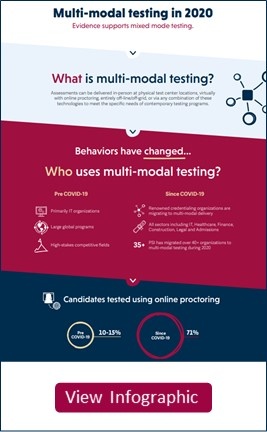In my last blog post, The State of Credentialing, a Year in Review, I talked about the key insights, challenges, and highlights from 2020 — a pretty memorable year for us all. In many cases the events of 2020 have caused changes to work as we know it, impacting many individuals and organizations, such as the mass move to remote working, business model changes, and credentialing organizations moving to multi-modal testing. In the testing world, pre-pandemic the global online exam proctoring market was valued at $354.37 million in 2019 and by is expected to reach almost $1.2 billion by 2027, with this growth accelerated by the wide adoption of online proctoring during the Covid-19 outbreak.
I know, I know…references to the growth of the online proctoring market are aplenty, but just when I think we have exhausted the subject, I get another invitation to partake in some research or a webinar on the topic! It just shows the scale of growth, and frankly, moving to a multi-modal testing model is still the conversation of the hour!
As we settle into the new world, I thought I would share what I am expecting in 2021 as we begin to progress toward a new normal:

Research-led Decision Making for Clients
With the wide-scale adoption of existing and new clients to online proctored testing, we now have more data than ever. Organizations, including PSI, can now leverage these data sets that were collected and use it as an opportunity to adjust how we all serve our candidates and customers.
Online proctoring is being adopted on an unprecedented scale. And with the proctor not physically present (as there would be in a test center environment), all communication with test takers happens virtually. It’s hard for organizations to imagine and anticipate the impact this will have on the volume of incoming questions, calls, and emails.
However, this rich information gives us the opportunity to look into the data, identify common challenges test takers face, and improve processes and communications. Further we’re also now able to analyze testing data from before and during the pandemic, allowing us to compare testing preferences across modalities. We know that overall, test takers prefer to take their exams at home when given the option of testing at a test center or via online remote proctoring. We have also gathered psychometric evidence that shows that test takers’ performance is consistent between test centers and online proctoring.

With all this data, we can now deduce more from our testing programs than ever before. Examples of the types of data analyses we can conduct include data forensics techniques, which allow us to detect and prevent instances of misconduct, and web scanning techniques, which allow us to prevent proprietary exam content being shared. The abundance of live online proctoring data allows us to monitor and improve proctor training processes, among many other processes.
Data Privacy and Security
You would have to have been living under a rock to have not seen the increased scrutiny around the use of technology in assessment over the last year. Especially in the case of using artificial intelligence (AI) in testing in an effort to increase efficiency, reduce costs, and create unbiased data-driven decision-making. However, the use of AI in assessment has presented many challenges including the potential for privacy intrusion, discriminatory or biased outcomes, and legal and ethical risks in how AI-derived data is used and how decisions are made.
Security and privacy incidents often include both legal and public relations implications, and potentially even more so as testing programs have rapidly shifted to remote testing in response to the pandemic. The reality is that any incident may be judged — not only in the court of law, but also the court of public opinion — and results may differ. In fact, it is entirely possible to win in the court of law but lose in the court of public opinion. It is how we respond to the concerns that have been raised as a result of the adoption of online testing that matters. Every testing program should provide clear guidelines on its policies and how they conduct any form of testing, as well as its philosophies and activities used in engaging with test takers. See more on this in a video I recently shared, on how communicate your exam policies can prevent exam misconduct.
Another terrain that organizations are constantly having to navigate is the growing patchwork of data privacy laws that need to be complied with. GDPR and CCPA are being joined by many new laws being introduced by a growing number of countries. Working with test providers that are on top of compliance and privacy laws who you can seek advice where possible will make your life easier, and your processes stronger.
Alternative Credential Models
Another trend that we can expect to see and grow in popularity is alternative credentialing models. These are usually created as alternative models to target specific needs so the testing organization can bring a program to market in a timely manner. This may be to address a skills gap, such as credentialing programs to qualify pharmacists to administer Covid-19 vaccines. In the IT industry, many organizations launched programs that made certifications more accessible to help upskill individuals when unemployment rates were increasing rapidly.
We worked with our long-term IT client, ISACA, to release a new IT practitioner program that featured a series of micro-credentials with performance testing to tackle some core skill sets that are more relevant in the new working world. The new Information Technology Certified Associate™ (ITCA™) credential, ISACA’s first stackable credential focuses on a very specific demographic — anyone looking to start a career in technology — whether fresh out of university/school or switching careers. Read more here about this pioneering program to address the skills gap and improve the employability of all.
Alternative credential models are not new, but organizations are using them in very new and innovative ways to fill skill gaps created during the COVID-19 pandemic.
Overall, the testing market has worked hard to respond to the changes in demand over the last year and ensure that professionals and students alike are able to obtain the qualifications they need to pursue their intended career paths. This rapid adoption did not come without its challenges and everyone has had to adapt in order to maintain testing continuity. However, many of the changes, especially the widespread use of multi-modal testing, are here to stay. Now is the time to reflect on lessons learned and create optimal testing models for the future of the credentialing industry.


 Rory McCorkle, PhD. is the Senior Vice President, Certification & Admissions at PSI Services LLC. He has extensive experience both managing and consulting for credentialing programs, specializing in the strategic organization of these programs, their design and development. During his career, Rory has worked with over 350 associations and IT credentialing organizations, including well-known licensure programs and globally renowned certifications. Rory received his PhD in Organizational Leadership from The Chicago School of Professional Psychology, as well as his MBA from Drexel University’s College of Business.
Rory McCorkle, PhD. is the Senior Vice President, Certification & Admissions at PSI Services LLC. He has extensive experience both managing and consulting for credentialing programs, specializing in the strategic organization of these programs, their design and development. During his career, Rory has worked with over 350 associations and IT credentialing organizations, including well-known licensure programs and globally renowned certifications. Rory received his PhD in Organizational Leadership from The Chicago School of Professional Psychology, as well as his MBA from Drexel University’s College of Business.